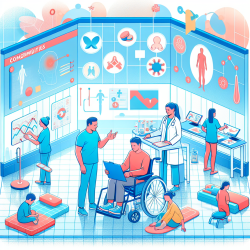Introduction
In recent years, artificial intelligence (AI) has made significant strides in various medical fields, including gastroenterology. A recent study, "Artificial Intelligence in Inflammatory Bowel Disease Endoscopy: Implications for Clinical Trials," highlights the transformative potential of AI in endoscopic assessments for inflammatory bowel disease (IBD). As practitioners, understanding and leveraging these advancements can enhance clinical outcomes and streamline trial processes.
The Role of AI in IBD Endoscopy
AI technologies, particularly machine learning and deep learning, are reshaping the landscape of IBD endoscopy. These technologies enable precise assessment of endoscopic activity, improving both the accuracy and efficiency of clinical trials. AI can assist in:
- Enhanced Image Interpretation: AI algorithms can process and analyze endoscopic images more consistently than human observers, reducing interobserver variability.
- Improved Patient Recruitment: AI can match patient data with trial criteria, ensuring appropriate candidates are selected, which enhances trial efficiency and outcomes.
- Cost Reduction: By minimizing the need for multiple human readers, AI can significantly cut down on trial costs, making trials more accessible and sustainable.
Implementing AI in Clinical Practice
For practitioners looking to integrate AI into their clinical practice, several steps can be taken:
- Stay Informed: Regularly review the latest research and developments in AI applications within gastroenterology to understand emerging trends and technologies.
- Collaborate with Tech Experts: Partner with technology experts to implement AI tools that are tailored to your practice's needs, ensuring seamless integration and optimal use.
- Participate in Training: Engage in training programs and workshops that focus on AI applications in IBD, enhancing your ability to utilize these tools effectively.
Encouraging Further Research
While AI presents numerous opportunities, it also poses challenges, such as potential biases in datasets and the need for high-quality data. Practitioners are encouraged to contribute to research efforts by:
- Participating in Clinical Trials: Engage in trials that utilize AI, providing valuable data and insights that can refine and improve AI algorithms.
- Collaborating on Research Projects: Work with academic and industry partners to explore new applications of AI in IBD, driving innovation and discovery.
Conclusion
AI is poised to revolutionize IBD endoscopy, offering enhanced accuracy, efficiency, and outcomes in clinical trials. By embracing these technologies, practitioners can improve patient care and contribute to the advancement of gastroenterology. To delve deeper into the research, read the original paper: Artificial Intelligence in Inflammatory Bowel Disease Endoscopy: Implications for Clinical Trials.










